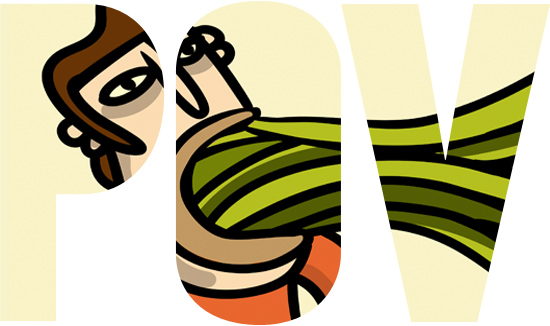POV: Let’s Stop Playing the “Who’s Racist” Game
Prejudice isn’t just about what you say or do

A recent BU Today article about racial microaggressions effected an important, though fiery, conversation about race. Many of the individuals who commented stated that the article and the quoted parties unfairly portrayed white people as being racist. As one of the quoted parties, I’m here with a simple request: let’s stop playing the “who’s racist” game and look at the big picture.
The United States of America is racially and ethnically diverse. The idea of an open and welcoming nation is a powerful one. On the surface, the numbers seem to corroborate the idea that the United States is indeed a beacon of diversity. Among the more than 300 million people in the country, 20 per cent speak a language other than English at home, and nearly 13 per cent were born in a foreign country. But an examination of the presence of difference alone does not help us understand the country’s continued uneasiness with race.
The racial diversity of the United States is a product of its history, which includes enslavement, immigration quotas based on race, and the subjugation of groups of people. While it may seem that the country has left its racism in antiquity, the legacy of the policies is still very much alive. We need to understand our racial identities, including our attitudes and feelings towards race, in the context of this history. Unfortunately, most people have not spent enough time in honest self-examination to fully appreciate their place in a society that continues to struggle with race.
This lack of self-awareness creates an unhelpful environment for a conversation about race. The comments in response to the BU Today article are indicative of this, and they’re a sign that we need to change the way we talk about race. We need to stop trying to find racist people or to immediately deny being racist. It’s a misguided way to fix a problem that far exceeds what happens between two individuals. Racism is a systemic problem that requires all of us, of all races, to participate in creating a more equal and open society.
Racism at large has been so detrimental to our unity as a country that we remain a racially divided country. Even in light of our racial diversity, the United States ranks as one of the least tolerant and most segregated nations. Due to the policies that shape our daily lives, we are still separated, and this fuels the fires of racial conflict. Our country cannot continue to exist with such disparate racial experiences.
What does this all mean for our day-to-day interactions? It simply means we need to start focusing on the bigger picture. When someone states that what you may have said or done is offensive, be open to listening actively and speaking honestly. If you can’t be open to having a difficult conversation about an interaction between two people, how can you expect to learn about something as insidious as a systemic problem?
“POV” is an opinion page that provides timely commentaries from students, faculty, and staff on a variety of issues: on-campus, local, state, national, or international. Anyone interested in submitting a piece, which should be about 700 words long, should contact Rich Barlow at barlowr@bu.edu. BU Today reserves the right to reject or edit submissions. The views expressed are solely those of the author and are not intended to represent the views of Boston University.
Comments & Discussion
Boston University moderates comments to facilitate an informed, substantive, civil conversation. Abusive, profane, self-promotional, misleading, incoherent or off-topic comments will be rejected. Moderators are staffed during regular business hours (EST) and can only accept comments written in English. Statistics or facts must include a citation or a link to the citation.